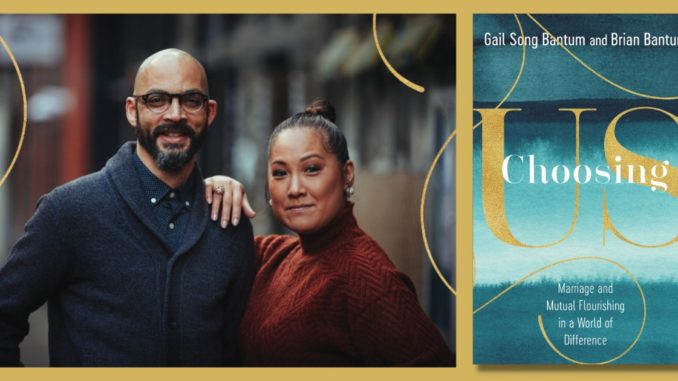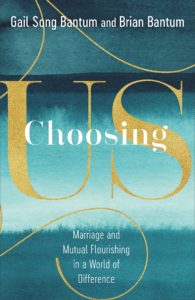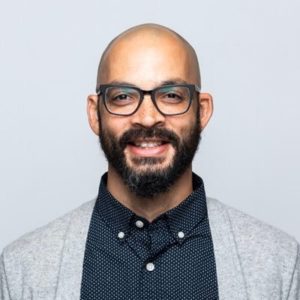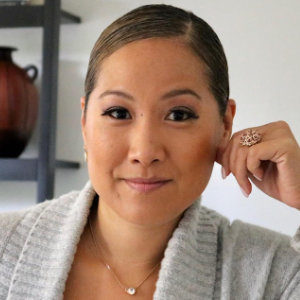
Podcast (beyond-the-page): Play in new window | Download
Subscribe: Apple Podcasts | RSS
Marriage books. Ever since the LaHaye’s The Act of Marriage, Christian marriage books have been come and gone and almost all of them have been from a conservative, complementarian, how-to perspective. In Choosing Us, Brian and Gail Song Bantum reframe the conversation by simply telling their story. A few weeks ago, Brian joined me on the podcast to talk a little more about that story.
The Conversation | Brian Bantum
This interview excerpt has been lightly edited for clarity and conciseness. Listen to the full interview in the player above or wherever you get your podcasts.
Josh Olds: Now, I want to start off, this is a marriage book, but it’s not what you might think of when you think of a marriage book. What sets this apart from other books that might be considered in that genre?
Dr. Brian Bantum: Yeah, well, the book really began when Gail—she prays and fasts the beginning of every year, and at the end of this praying and fasting she woke up one day and said, “We need to write a book together.” And, I’ve written books before, and Gail has some books that she wants to wants to write. So we’ve kind of been in ministry together tangentially. We haven’t always served in the same church, but we’ve always had a sense of call together. And that’s always been part of our journey. When we started thinking a little bit about the book that we would write together, initially, it was maybe leadership, or maybe race, or kind of intercultural realities. But the more we started really thinking about it, we realized that there were so many couples, young couples especially, in our lives who were both trying to help each other flourish but didn’t know what that looked like. And inevitably, the woman was kind of having to slow down a little bit. And then a lot of couples that we taught, were dealing with realities of race in the midst of all of the kind of the protests and violence in the United States. And that was having an effect on their relationship.
We realized that there isn’t, there actually isn’t a book out there, that talks about marriage apart from some of those kind of old complementarian kind of viewpoints, where there are very specific roles for the man and very specific roles for the woman, books that actually presume that marriage is between a man and a woman and doesn’t imagine other possibilities of what marriage and covenant life could look like. And we started to realize, you know, this is actually a lot of our story, both our own stories, kind of thinking about what racial life means, as well as trying to think a little bit about what the different ways of imagining how gender shapes our relationship, and how it shapes our imagination going forward. So the idea was let’s offer our story, not necessarily as a kind of, oh, if you do these five things, you’ll have a successful marriage. More just as a sharing of our story. And we hope that people find a different way to imagine what their lives could look like along the way.
We realized that there wasn’t a book out there that talked about marriage apart from some of those kind of old complementarian kind of viewpoints…[and] presumed that marriage was between a man and a woman and didn’t imagine other possibilities of what marriage and covenant life could look like. – Brian Bantum
Josh Olds: I’ve met so many people over the course of the past few years that have sort of gone down this path of moving away from their more conservative evangelical upbringing to a more progressive faith. They’re deconstructing, but their spouse hasn’t. So they find themselves…they’re the one who moved…and that creates a conflict in the household because those areas can be very contentious. And it manifests itself politically as much as it does theologically. Do you have any advice for people who are in that situation? On how to sort of navigate those conflicts?
Brian Bantum: Yeah, I guess there’s probably maybe two two levels of conflict. So one is the ideological and theological. We have very different beliefs about who God is or about what the Bible is or how to read it. I think to some extent, you could say, you know, “I’ll let God speak through the way that you read, I’ll let God speak through the way that I read.” I’ll honor…because I can understand how you’ve been formed, having been there myself, as long as you can respect that these are the things that I’ve read, these are the experiences that I’ve had, that have led me to a different place. And hopefully, there’s a kind of relationship there where you’ll want to read what I’ve read, and to understand at least why I got to where I did. I think that’s one level where, you know, if there’s a kind of communication, that kind of trust in one another, you should be able to live in the house with one another, love one another, and trust what will happen over time.
But I think there’s another level that’s probably harder, which is to say, you know, when a belief is attached to a practice, or a way of life that constricts another person’s flourishing, So maybe one, maybe the woman’s theology has become more progressive, but the man’s theology remains more conservative. Right? But that theology means that there are things that the woman can’t do and he’s going to make sure she can’t do it. I think that’s a more difficult one because essentially, his theology is diminishing her possibilities of material flourishing. It’s determined what her life will mean. And and I think that there are some deeply problematic aspects of that kind of relationship.
Or you could also turn it externally to say, you know, I’ve become more progressive, you’ve remained conservative, but now in your conservatism, you are justifying the killing of Black men. You are, in your vote, in your in your dollars—our dollars that we’re earning—are supporting causes that justify violence and the desecration of the imago Dei. I can’t abide with that. And so, I think those become more serious conversations that, hopefully, you know, each person is willing, again, to acknowledge and listen, but if it, if it starts to result in some very material violence and mitigations, I think that those are, those are places where, you know, a couple might need to have a really serious conversation about what their lives look like together.
The Book | Choosing Us
 Read Life is Story’s full review here.
Read Life is Story’s full review here.
For years, people have asked Gail Song Bantum and Brian Bantum to reveal the secret to their marriage as a multiracial Christian couple, each with a high-profile ministry calling. This book reveals the lessons, mistakes, and principles that have helped the Bantums navigate race, family history, and gender dynamics in their twenty-plus years of marriage, while inspiring readers to pursue mutual flourishing in their marriages and relationships.
Marriage is about more than constant bliss or unending sacrifice, say the Bantums. It’s about exploring your own story, seeing the other for who they are (even as they change), and being flexible in discovering how those differences and stories come alive in new ways when joined together. It’s the discovery of life in the gaps and the mysteries that emerge when we live in mutuality, believing that fullness is possible for each.
Choosing Us reflects the realities and demands of modern marriage and respects the callings and ambitions of both partners. It shows that marriage is about choosing the other’s flourishing on a daily basis, amid differences and even systemic obstacles, to build a relationship that thrives and reflects the kingdom of God.
The Author | Brian Bantum
 Dr. Brian Bantum is the Neil F. and Ila A. Professor of Theology at Garrett-Evangelical Theological Seminary. He writes and teaches on the intersections of theology and embodiment, particularly on questions of race and identity. He is a contributing editor for The Christian Century and has published three books: Redeeming Mulatto: A Theology of Race and Christian Hybridity and The Death of Race: Building a New Christianity in a Racial World and most recently, Choosing Us: Marriage and Mutual Flourishing in a World of Difference, co-authored with his spouse, Rev. Gail Song Bantum. He speaks throughout the country on how racial imagination shapes our identity and how our lives as disciples might live into the fullness of God’s life and create spaces of justice and flourishing and life in their midst, becoming slight glimmers of God’s present and coming kingdom.
Dr. Brian Bantum is the Neil F. and Ila A. Professor of Theology at Garrett-Evangelical Theological Seminary. He writes and teaches on the intersections of theology and embodiment, particularly on questions of race and identity. He is a contributing editor for The Christian Century and has published three books: Redeeming Mulatto: A Theology of Race and Christian Hybridity and The Death of Race: Building a New Christianity in a Racial World and most recently, Choosing Us: Marriage and Mutual Flourishing in a World of Difference, co-authored with his spouse, Rev. Gail Song Bantum. He speaks throughout the country on how racial imagination shapes our identity and how our lives as disciples might live into the fullness of God’s life and create spaces of justice and flourishing and life in their midst, becoming slight glimmers of God’s present and coming kingdom.
Dr. Bantum lives in Seattle, WA with his spouse, Rev. Gail Song Bantum and their three (almost) grown children. There he can be seen riding his bike or walking his dog or making espresso for the family. While not a native of the Pacific Northwest, it has clearly sunk in.
The Author | Gail Song Bantum
 Reverend Gail Song Bantum is the Lead Pastor of Quest Church, an urban, multi, and inclusive community in the heart of Seattle. Pastor Gail is particularly passionate about empowering emerging leaders and is a highly sought after speaker, preacher, and consultant. She is a contributing author of the New York Times Bestseller, A Rhythm of Prayer: A Collection of Meditations for Renewal, edited by Sarah Bessey, and co-author of Choosing Us: Marriage and Mutual Flourishing in a World of Difference.
Reverend Gail Song Bantum is the Lead Pastor of Quest Church, an urban, multi, and inclusive community in the heart of Seattle. Pastor Gail is particularly passionate about empowering emerging leaders and is a highly sought after speaker, preacher, and consultant. She is a contributing author of the New York Times Bestseller, A Rhythm of Prayer: A Collection of Meditations for Renewal, edited by Sarah Bessey, and co-author of Choosing Us: Marriage and Mutual Flourishing in a World of Difference.
Pastor Gail received her M.Div. from Duke Divinity School and is an ordained minister in the Evangelical Covenant Church. She and her husband, Dr. Brian Bantum, have three young adult sons and reside in Seattle, WA.
